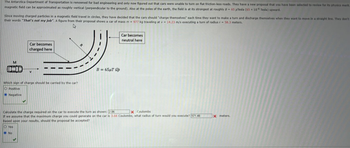Question

Transcribed Image Text:The Antarctica Department of Transportation is renowned for bad engineering and only now figured out that cars were unable to turn on flat friction-less roads. They have a new proposal that you have been selected to review for its physics merit
magnetic field can be approximated as roughly vertical (perpendicular to the ground). Also at the poles of the earth, the field is at its strongest at roughly B= 65 μTesla (65 x 10¹6 Tesla) upward.
Since moving charged particles in a magnetic field travel in circles, they have decided that the cars should "charge themselves" each time they want to make a turn and discharge themselves when they want to move in a straight line. They don't
their words "That's not my job". A figure from their proposal shows a car of mass m - 977 kg traveling at v= 14.23 m/s executing a turn of radius r= 58.3 meters.
M
Car becomes
charged here
Negative
V
◆
Which sign of charge should be carried by the car?
O Positive
R
B=65µT up
Car becomes
neutral here
Calculate the charge required on the car to execute the turn as shown: 2.06
X Coulombs
If we assume that the maximum charge you could generate on the car is 3.66 Coulombs, what radius of turn would you execute? 571.48
Based upon your results, should the proposal be accepted?
O Yes
No
X meters.
Expert Solution
This question has been solved!
Explore an expertly crafted, step-by-step solution for a thorough understanding of key concepts.
This is a popular solution
Trending nowThis is a popular solution!
Step by stepSolved in 3 steps with 2 images

Knowledge Booster
Similar questions
- Physics 9. A 100-m-long wire carrying a current of 4.0 A will be accompanied by a magnetic field of what strength at a distance of 0.050 m from the wire? (magnetic permeability in empty space μ0 = 4p´ 10-7 T´m/A). (Show step by step solution)arrow_forwardYou have learned that a charge moving in an magnetic field can experience a magnetic force. Remarkably, anytime that a charged particle moves that particle produces its own magnetic field! The image below of magnetic compasses forming a circle around a current-carrying wire demonstrates the shape of the magnetic field. The magnetic field lines forms concentric circles around that wire. The strength of the field decreases with increasing distance away from the wire. If the current in the wire is 1.15A, what is the magnitude of the magnitude of the magnetic field (in ?μT, or micro-Tesla) a distance of 0.88m away from the wire?arrow_forwardPhysics 6. A loop of area 0.250 m2 is in a uniform 0.020 0-T magnetic field. If the flux through the loop is 3.8310-3 T·m2, what angle does the normal to the plane of the loop make with the direction of the magnetic field?arrow_forward
- A proton, that is accelerated from rest through a potential of 55 kV enters the velocity filter, consisting of a parallel-plate capacitor and a magnetic field, shown below. What is the proton's speed? Take mp 1.67 × 10-27 kg and e = = 1.6 × 10-¹⁹ C. P = E The magnetic field, B = (x) B (x) The speed, v = The E-field between the plates is 2.2 × 105 N/C. What B-field is required so that the protons are not deflected? Units Select an answer ✓ X Units Select an answer ✓arrow_forwardA singly charged ion (an ion missing one electron) with a velocity of 7,642 m/s is injected perpendicular to a 0.277 T magnetic field, and the ion moves in a circle of 66.8 mm radius. What is the molar mass of the ion in grams? (Remember to use grams and Avogadro's number to get molar mass. State the answer as an integer with no unit.) Moving to another question will save this response. Question & of aarrow_forwardIn vacuum, magnetic force on a moving charged particle provides an acceleration to the particle. Thus, it also changes the kinetic energy of the particle. O True O False The direction of magnetic force is perpendicular both to the velocity of the particle and to the magnetic field. True O False The net magnetic force acting on any closed current-carrying loop in a uniform magnetic field is zero. True O False All electric field lines are continuous and always form closed loops. OTrue Falsearrow_forward
- Consider a long, horizontal Large Wire with current of 10 A running through it. We want to levitate a horizontal, thin, 0.50 m length of wire above it. If the thin wire has a mass of 10 grams, and a current of 300 mA, how far above the Large Wire will it hover (net force of zero) due to magnetic and gravitational forces? A. If the thin wire hovers above the Large Wire due to their magnetic fields, are their currents going the same direction, or opposite directions. Explain. B. Draw a diagram and label the directions of currents, and all other relevant quantities and vectors. C. Find the distance above the Large Wire the small thin wire will hover (net force of zero). D. Would your answers to parts A and C change if we wanted to find a distance below (rather than above) the Large Wire that the smaller thin wire could hover, due to their magnetic fields. Explain. Don't calculate any values but draw a new diagram and explain how this situation compares to the problem above.arrow_forwardWrite down an expression for the force experienced by an electron moving with a velocity, v, in a magnetic field B. By equating this expression to the force required to cause electrons to follow a circular path of radius, r, derive an expression for the ratio, (?⁄?) for an electron in terms of the magnetic field strength, the radius of the circular path and the accelerating potential, V.arrow_forwardHW #6arrow_forward
arrow_back_ios
arrow_forward_ios